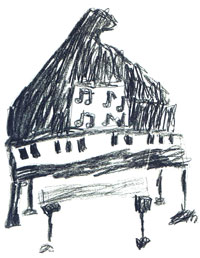 Dramatic Enhancment
Dramatic Enhancment
Physics Professor Dr. Gordon Shaw stated that keyboard was the instrument of choice because "of its linear and audible representation of the relationship between sounds."
Starting at 3, and after two years of keyboard instruction, children continued to score high in math skills and on spatial-temporal tests. Numerous studies show keyboard instruction dramatically heightens abstract reasoning skills necessary for math and science.
Music is an Amazing Learning Aid!
In a study conducted by Dr. Frances Rauscher in 1994, piano was rated "far more superior to computer instruction at ages 3 and 4." Dr. Rauscher's research project in Los Angeles took 3 year olds and gave them keyboard and singing lessons for 8 months. At the end of the study, the children who received lessons increased their spatial-temporal reasoning by 46% as opposed to those who had no lessons, at 6%.
Studies have shown that keyboard instruction makes the most significant difference in the younger children. (Bilharz, Bruhn and Olson, 2000).
Many recent studies out of the Institute of Cognitive Neuroscience have found that "the brain changes after learning to read and play music." Reading and decoding music symbols into a musical response such as playing the piano develops reaction time and gives instant feedback.
Dickenson, in 1993, found that when a child studies an instrument both the right and left hemisphere of the brain are charged, as opposed to simply listening to classical music during which time only the right hemisphere of the brain is activated.